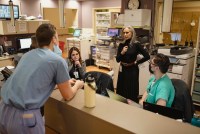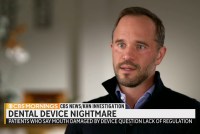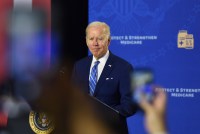Latest Morning Briefing Stories
Medicaid Health Plans Try to Protect Members — And Profits — During Unwinding
States are turning to the big health insurance companies to keep Medicaid enrollees insured once pandemic protections end in April. The insurers’ motive: profits.
Why Does Insulin Cost So Much? Big Pharma Isn’t the Only Player Driving Prices
Big Pharma may be moving on from squeezing diabetes patients on insulin prices, but it’s the arbitrators that jack up prices for those who can least afford them.
Watch: Emergency Room Turns Simple Injury Into a Big Bill
This installment of InvestigateTV and KHN’s “Costly Care” series looks at the case of a New Orleans woman whose thumb injury saddled her with a big ER bill for a tetanus shot and some minor care.
For Young People on Medicare, a Hysterectomy Sometimes Is More Affordable Than Birth Control
While Medicare was designed as health insurance for those 65 and older, it also covers people with disabilities who are young enough to still get pregnant. Yet they often struggle to get their birth control covered and end up with large medical bills — or instead opt for hysterectomies or tubal ligations, which Medicare sometimes will cover.
Biden Administration Urged to Take More Aggressive Steps to Relieve Medical Debt
Consumer and patient advocates push for new federal rules to protect Americans from debt collectors and force hospitals to make financial assistance more accessible.
Hospitales rurales aplican a nuevo programa federal para intentar sobrevivir
Más de 140 hospitales rurales han cerrado en todo el país desde 2010, y observadores de políticas de salud no están seguros de cuántas de las más de 1,700 instalaciones rurales elegibles para la nueva designación aplicarán a un nuevo programa.
Journalists Discuss Insulin Prices, Gun Violence, Distracted Driving, and More
KHN and California Healthline staff made the rounds on national and local media this week to discuss their stories. Here’s a collection of their appearances.
Decisión de Eli Lilly de bajar el precio de su insulina logrará cambios históricos en los costos
Expertos en precios de medicamentos celebraron la noticia de Eli Lilly y otros esfuerzos. Y estas otras iniciativas para llevar al mercado insulina de menor costo, a su vez, presionarían a Eli Lilly para que mantuviera sus precios bajos.
What the Health? From KFF Health News: March Medicaid Madness
President Joe Biden and Republicans in Congress spent last month sparring over whether to shield Medicare and Social Security from budget cuts — leading some to wonder if Medicaid was on the table instead. Biden and Democrats say no, but some Republicans seem eager to trim federal spending on the health program for Americans with low incomes. And ready or not, artificial intelligence is coming to medical care. Benefits, as well as unintended consequences, are likely. Alice Miranda Ollstein of Politico, Rachel Cohrs of STAT News, and Lauren Weber of The Washington Post join KHN’s chief Washington correspondent, Julie Rovner, to discuss these issues and more.
Eli Lilly Slashed Insulin Prices. This Starts a Race to the Bottom.
Eli Lilly’s news that it plans to cut insulin costs for patients will help, not hinder, the recent efforts in California and by entrepreneurs such as Mark Cuban to offer lower-cost alternatives, drug pricing experts said.
Watch: Dental Device at Center of Lawsuits Was Used on Patients Without FDA Review
More than 10,000 dental patients have been fitted with an Anterior Growth Guidance Appliance, or AGGA, according to court records. But the unproven and unregulated device has not been evaluated by the FDA, according to a months-long joint investigation by KHN and CBS News.
After People on Medicaid Die, Some States Aggressively Seek Repayment From Their Estates
States take drastically different approaches to recovering Medicaid money from deceased participants’ estates. Demands for repayment of Medicaid spending can drain the assets a person leaves behind, depending on where they lived.
California’s Massive Medicaid Program Works for Some, but Fails Many Others
Medi-Cal serves more than one-third of the state’s population — offering a dizzying range of care to a diverse population. In the new “Faces of Medi-Cal” series, California Healthline will assess the program’s strengths and weaknesses through the lives and experiences of its enrollees.
This Dental Device Was Sold to Fix Patients’ Jaws. Lawsuits Claim It Wrecked Their Teeth.
A dental device called AGGA has been used on about 10,000 patients without FDA approval or proof that it works. In lawsuits, patients report irreparable harm. The AGGA’s inventor and manufacturer have denied all liability in court.
Biden Promises to Fight GOP on ‘Gutting’ Medicaid. Budget Talks Seem Like Another Story.
As many lower-income Americans prepare to lose pandemic-era access to Medicaid, President Joe Biden vowed to stop Republicans from making deeper cuts to lower the national debt. Other changes may still be up for discussion.
Surprise-Billing Law Loophole: When ‘Out of Network’ Doesn’t Quite Mean Out of Network
Billing experts and lawmakers are playing catch-up as providers find ways to get around new surprise-billing laws, leaving patients like Danielle Laskey of Washington state with big bills for emergency care.
After Capping Insulin Copays, Colorado Sets Its Sights on EpiPens
Colorado’s proposed legislation to cap the copay for the EpiPen is part of a nationwide trend as more states try to shield patients from skyrocketing drug prices.
California dice que ya no puede costear las pruebas de covid ni las vacunas para los migrantes
El estado mantiene tres centros de recursos sanitarios —dos en el condado de San Diego y uno en el condado de Imperial— que realizan pruebas y vacunaciones contra covid y otros exámenes de salud, y han atendido a más de 300,000 migrantes desde abril de 2021.
California Says It Can No Longer Afford Aid for Covid Testing, Vaccinations for Migrants
Gov. Gavin Newsom is winding down state assistance for health care services to migrants seeking asylum. He’s lobbying the Biden administration to increase aid along the state’s southern border.
A Bitter Battle Over the ‘Orphan Drug’ Program Leaves Patients’ Pocketbooks at Risk
Patients who depend upon special drugs to treat rare diseases are caught in the crossfire as drugmakers and the FDA battle over regulations that reward companies for developing treatments for relatively small pools of patients.
























